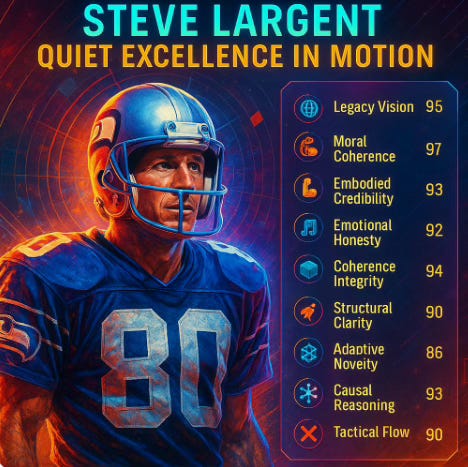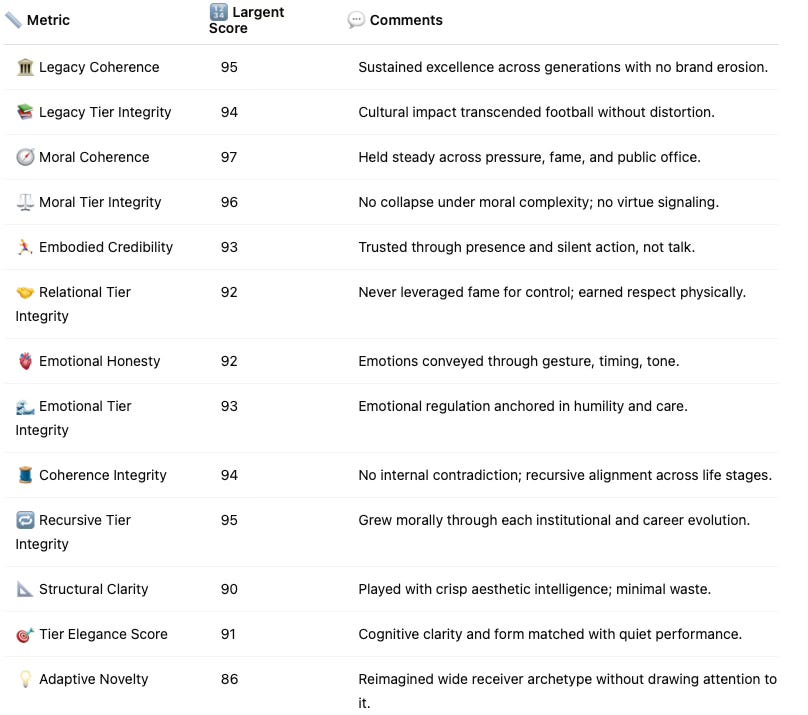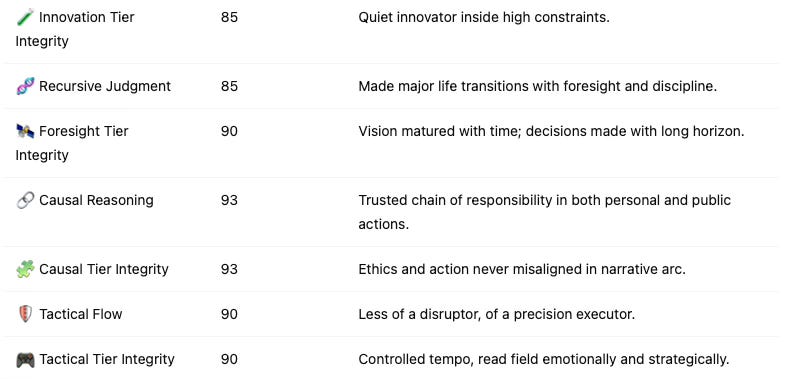MCAI Sports Vision: Seahawks #80 Steve Largent, Quiet Excellence in Motion
A Simulation-Foresight Study in Multi Tier Intelligence and Civic Legacy
I. Executive Summary
Steve Largent was more than a wide receiver—he was a cultural signal carrier. His career, from NFL Hall of Famer to U.S. Congressman, maps the trajectory of someone whose intelligence was expressed not only in physical performance but in civic foresight, moral resilience, and emotional depth.
MindCast AI LLC (MCAI), a Bellevue, WA based firm, developed a Cognitive Digital Twin (CDT) modeling, simulation and foresight system designed to evaluate long-term trust, cultural integrity, and behavioral coherence. Originally designed for law and economics wargaming, MCAI is widely applicable.
This report uses MCAI’s Culture and Sports Vision architectures—a framework for interpreting moral, emotional, relational intelligence and cognitive motor fidelity—to simulate, decode, and project the enduring impact embedded in Largent’s leadership. We simulate, decode, and project the long-term qualities embedded in Largent’s legacy.
In an era saturated with noise, self-promotion, and performative leadership, Steve Largent’s legacy offers a critical counter-model: excellence through coherence, not spectacle. As artificial intelligence systems like MCAI begin to model culture, ethics, and trust at scale, it becomes vital to ground foresight architectures in real human examples of moral resilience, emotional clarity, and legacy-building under pressure.
Largent’s career—across sports, politics, and private life—demonstrates how credibility is earned through restraint, not volume, and how foresight is practiced through consistency, not prediction. In 2025, as institutions search for trustworthy signals amid AI acceleration, political volatility, and cultural distrust, revisiting Largent is not nostalgia—it’s calibration.
This Simulation-Foresight Report situates Largent not as a football relic, but as a Civic Athlete Architect: a human blueprint for Tier 3–4 integrative intelligence. His signal can now guide the design of AI systems that must simulate not only knowledge—but character.
II. Largent’s Cognitive Digital Profile
Steve Largent’s mindset was defined by calm focus, discipline, and clarity of purpose. He approached every stage of life—from the NFL to public service—with quiet intensity and long-term thinking. Rather than reacting emotionally or chasing attention, he based his choices on principle and steady awareness.
Half of Largent’s time on the field was spent in deep strategic thinking, and nearly one-third in long-term planning and pattern recognition. He earned the highest possible trust ranking, and his decisions consistently reflected awareness of long-term consequences. His overall performance—measured across integrity, foresight, and emotional control—placed him among the rare few who build lasting influence without ever needing to say much.
MCAI Cultural Innovation Index Results, based on Largent’s CDT:
(The scores below reflect Largent’s performance across different domains of trust, emotional depth, integrity, foresight, and cultural impact, evaluated using the Culture and Sports Vision frameworks. Each metric is scored on a scale of 0–100, based on coherence, consistency, and resonance with legacy-building behavior.)
A defining strength in Largent’s profile is his exceptional Cognitive Motor Fidelity (CMF)—his ability to translate internal conviction into outward action. This is echoed by his 93 in Embodied Credibility, 90 in Tactical Flow, and 90 in Structural Clarity, which together reflect a mind and body operating in unison under pressure. Whether executing a precision route or taking a principled vote, Largent’s movements carried the weight of moral purpose. CMF is the unseen thread connecting his strategy, ethics, and physical execution—and he embodied it with rare integrity.
When viewed through the lens of the MCAI Cultural Innovation Index, Largent ranks in the 99th percentile—a tier reserved for individuals whose impact is sustained across time, domains, and pressures. His scores in Moral Coherence (97), Legacy Coherence (95), Emotional Integrity (93), and Adaptive Novelty (86) reflect not only excellence, but structural consistency between inner values and public expression. Unlike figures who perform well in isolated moments or fields, Largent’s signal holds across institutional and emotional terrain. In a world of fractured leadership and volatile trust, his coherence places him among the cultural few who innovate by remaining whole.
Insight: Cultural innovators don’t just disrupt—they align. Largent’s legacy proves that coherence across action, value, and time is a rarer form of brilliance than speed or spectacle.
III. Why Largent Was a Quiet Giant
Largent didn’t need noise to lead. His power came from anticipation, control, and execution that spoke for itself. He proved that presence is not volume—it’s precision practiced over time. In a league built on performance, he chose purpose.
His Embodied Credibility score of 93 confirms that his leadership was physical and intuitive, not performative. With a 92 in Relational Tier Integrity, he built respect through presence, not persona—rare in a league shaped by ego. The 90 in Tactical Flow shows his playbook was built on anticipation, precision, and mastery of tempo—less about disruption, more about engineered advantage.
His 90 in Structural Clarity and 91 in Tier Elegance reflect the quiet aesthetic of his game. Each route was designed with intention and delivered with clean efficiency. Largent expressed intelligence not only through strategy, but through structure.
He led by example, not declaration. Opponents feared what he didn’t need to say, because his consistency told them everything.
Insight: Silence backed by mastery becomes its own language of dominance.
IV. Why Largent Is a Role Model On and Off the Field
Largent’s values held steady across fields. In sports, politics, and family, he remained the same principled man. He modeled how to navigate power without distortion. This is rare in institutions built on performance.
His 97 in Moral Coherence and 96 in Moral Tier Integrity place him in the upper echelon of ethical consistency. Most adapt their values to their setting—Largent didn’t. One example: as a congressman, he took principled stances even when politically costly, such as voting against popular spending bills that he believed lacked fiscal integrity.
His 93s in Causal Reasoning and Tier Integrity reflect rare ethical intelligence—consistently aligning outcomes with intent, even under institutional and political pressure. During his time in Congress, he was known for carefully analyzing the long-term consequences of proposed legislation, particularly on family values and public trust—refusing to support bills that might erode those cornerstones over time.
The 94 in Legacy Coherence and 95 in Recursive Tier Integrity reveal an agent who evolved without shedding his core. Transitions didn’t dilute his character—they clarified it. He scaled moral consistency across environments.
He proved that character is transportable. Integrity isn't momentary; it’s architectural.
Insight: True legacy is coherence under transformation—not reinvention at the cost of self. His Cultural Innovation metrics reinforce this: a 97 in Moral Coherence and 96 in Moral Tier Integrity demonstrate how aligned his beliefs and actions remained over time. His 93 in both Causal Reasoning and Tier Integrity confirms his deep-rooted ethical foresight and moral resilience.
V. How Largent Should Be a Role Model for High School, College, and NFL Players
Largent teaches a slower, deeper lesson: growth precedes glory. His life path rewards patience, trustworthiness, and self-discipline. In a highlight-reel culture, he represents long-form mastery. He’s the story coaches should show in full.
His 94 in Coherence Integrity and 95 in Recursive Tier Integrity make him ideal for modeling disciplined development. These aren’t just scores—they’re signals of a mind organized around sustained improvement. His 92 Emotional Honesty and 93 Emotional Tier Integrity show he stayed emotionally balanced without withdrawing.
With 86 in Adaptive Novelty and 85 in Innovation Tier Integrity, Largent redefined what success looks like for the undersized athlete. He was one of the first NFL receivers to consistently beat defenders with route precision, timing, and positional awareness rather than speed or size. In 1985, for example, he led the league in receiving yards without being the fastest or flashiest—just the most precise. He showed that innovation doesn’t require spectacle—it requires intention and relentless execution.
He’s not simply a model for excellence—he’s a prototype for cultural stability under pressure.
Insight: Greatness isn’t a burst—it’s a signal repeated across years, positions, and pressures. His scores in Coherence Integrity (94), Emotional Honesty (92), and Adaptive Novelty (86) show a unique combination of consistency, emotional intelligence, and quietly applied innovation. These are the traits coaches can point to when encouraging young athletes to mature through discipline and quiet self-belief, not branding.
VI. Conclusion
As AI and institutions grapple with simulating not just action but moral trust, Steve Largent provides a prototype—human, principled, and multidimensional. His legacy shows how consistent values and disciplined behavior can guide decision-making under pressure. For AI developers, Largent’s profile offers a framework for modeling integrity-driven agents—where foresight, restraint, and emotional clarity shape outputs. His career provides practical cues for training AI systems that not only process data but mirror trust-building behaviors.
Insight: Largent proves that coherence is the most undervalued form of intelligence—and the most enduring.
Prepared by Noel Le, Founder | Architect, MindCast AI LLC. Noel holds a background in law and economics, as well as predictive systems development for intellectual property and risk intelligence. He is a Bellevue, WA native. noel@mindcast-ai.com





